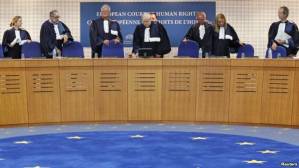Drop In European Court Cases From Russia Sparks Claims Of Foul Play
For the first time since its creation in 1959, the European Court of Human Rights is recording a drop in pending cases. The total number of applications from Russia, where the court is widely seen as a powerful means of redress against rights abuses, is also on the decline.
Russian cases pending before the court, based in the French city of Strasbourg, were cut back by almost one-third last year, from more than 40, 000 to 28, 600. The vast majority of reviewed applications were, as is usually the case at the court, rejected as inadmissible.
Moscow attributes this trend to a dip in the number of newly filed cases due to what officials describe as improved court practices in Russia, widely known for its corrupt and flawed justice system. They predict Russia will not top the list of countries accounting for the bulk of complaints at the European court for much longer.
Some Russian human rights advocates, however, are crying foul. They link the dwindling number of applications to the dispatch of Russian lawyers -- handpicked and paid by the Russian government -- to Strasbourg to help vet the cases that are before the court.
"It is no coincidence that this sharp decrease took place when a group of Russian lawyers started working there, " says Lev Ponomaryov, a Moscow-based rights activist. "They may not have been given clear instructions to cut down numbers. But they are sent by the Russian government, and many top Russians officials have said that there are too many complaints, that they need to be stemmed."
A Suspicious Drop?
The drop in Russian applications is partly the result of new rules introduced by the court in June 2012 to tighten the application process and reduce the tens of thousands of improperly prepared applications that clog the judicial body.
The court’s 2012 statistics have nonetheless sparked concern in Russia. Some media have accused the Kremlin of seeking to curb applications to the court instead of addressing the systemic problems prompting the complaints.
The European Court of Human Rights has credited the legal team sent by Moscow with helping tackle its huge backlog of Russian cases. Court officials have sought to reassure critics of the initiative, insisting the Russian lawyers -- most of whom are junior -- were being closely monitored.
But despite the court’s reputation for integrity, independent Russian lawyers like Karinna Moskalenko are worried. Moskalenko is a leading lawyer helping Russian plaintiffs sue their country at the Strasbourg court.
"The independence and impartiality of the people dealing with complaints should not be subject to doubt, just like the independence and impartiality of judges making decisions in those cases, " Moskalenko says. "I’m not satisfied by reassurances that several European court officials are overseeing the work of these lawyers."
’An Unsuccessful Experiment And Unacceptable Practice’
Frustrated with red tape and corrupt judges, Russians have turned en masse to the European Court of Human Rights since their country joined the Council of Europe, which oversees the court, in 1996. More than 20 percent of the 128, 000 applications currently pending before the court come from Russia, many of them from the volatile North Caucasus.
Moskalenko, who won the first-ever case from Russia heard at the court, says the legal team sent by Moscow risks depriving many Russians of their last chance at justice. She says the lawyers, although they do not have the authority to rule on the admissibility of applications, nonetheless play a critical role in the filtering process and can influence judges in dismissing important complaints on technicalities.
"They make decisions in the first stages on the prospects of applications, " the Russian lawyer says. "If applications are rejected without grounds, due either to a lack of experience or impartiality, the damage is huge. This can affect the European court’s standing. It’s in the court’s interest to end this practice."
Other independent lawyers have denounced Moscow’s lack of transparency in selecting lawyers for the European court. Moskalenko says the court reportedly has plans to expand what she calls an "unsuccessful experiment and unacceptable practice" to other Council of Europe member states.






